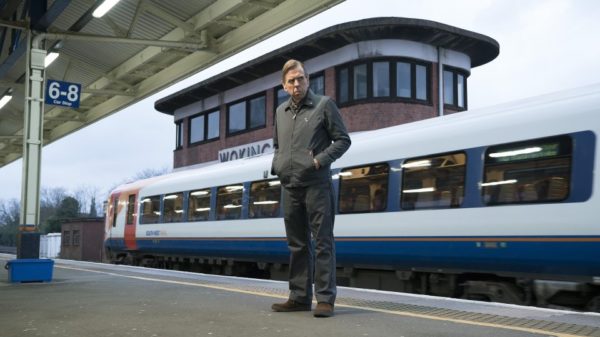We’re three episodes into Channel 4’s attempt to recreate the success of Black Mirror, and so far Electric Dreams has failed to set the world alight. It’s a delight, then, to see that this episode – The Commuter – is the first better than good episode of the series, and a promising sign of things to come.
When Ed (Timothy Spall), a dissatisfied train station worker in Woking, follows a mysterious woman to a location not present on the station’s database, he finds a seemingly idyllic town that feels too good to be true. When he returns at the end of the day, however, his son – who had been having increasingly violent psychotic episodes – has disappeared.
What sets this episode apart most is its setting. We’re not in some distant future or another world, but the most normal place imaginable. The morning commute is a strange period of our day when humanity is at its most autopilot, when we switch off and ready our minds for the day ahead. And so it makes perfect sense that this would be where the kinda sorta portal to another world would make itself known.
Casting Spall was a smart move, selling the ordinary strife of an ordinary family at the end of their tether. With their only son becoming increasingly violent, you get the sense that they’ve exhausted their options and, in an intimate bedtime conversation, they both deny that they are frightened of their own child. The reality, of course, is quite clearly different.
So when curiosity gets the better of him, Ed follows the station’s mysterious visitor to the station she mentioned, despite Macon Heights not actually existing. The town is filled with cake, happy couples and kids flying kites, but the seams soon start to show.
Once Ed returns home to finds that his son never existed, he becomes suspicious of the town and it’s potential impact on his life. There are lots of nifty little illustrations of the manipulation of reality, from the memories stored in the attic on VHS, to the flat house fronts – a toy town with toy people.
The emotional crescendo at the end of the episode, in which Ed angrily declares that dreaming about someone not being there isn’t the same as wishing it were true, is great. Best of all, the moral message behind the episode isn’t a crutch for it to lean on, but rather the cherry on top of an entertaining hour.
Now there are still a lot of problems with The Commuter, with a lot of the small details that make good sci-fi great feeling decidedly half-baked. The journalist that Ed visits after his first trip to Macon Heights is far too accepting of the story despite never having visited the town herself, and it’s never made clear whether Ed has forgotten his son or is simply being willfully ignorant about erasing an entire person.
But the episode succeeds in ways that The Hoodmaker and The Impossible Planet couldn’t. It’s felt so far like the show is trying it’s hardest to mirror rival anthology shows in their social commentary, and it’s resulted in underwhelming updates of Dick’s stories. It’s simultaneously trying to create modern day allegories and adapt older short stories, when really it should have done one or the other.
But The Commuter isn’t trying to shove the point about about how terrible our society is down the audience’s throats, or be too clever about its twists, it’s just taking us on an adventure and leaving us with some questions to discuss. Chiefly, is happiness really happiness if it’s a lie?

